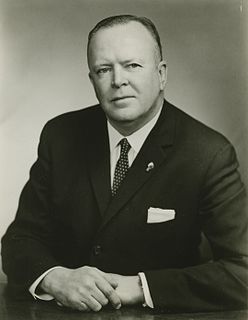A Quote by Murray Rothbard
Governments have persistently tried their best to promote, encourage, and expand the circulation of bank and government paper, and to discourage the people's use of gold itself.
Quote Topics
Related Quotes
When you own gold you're fighting every central bank in the world. That's because gold is a currency that competes with government currencies and has a powerful influence on interest rates and the price of government bonds. And that's why central banks long have tried to suppress the price of gold. Gold is the ticket out of the central banking system, the escape from coercive central bank and government power.
The threat of gold redeemability imposes a constant check and limit on inflationary issues of government paper. If the government can remove the threat, it can expand and inflate without cease. And so it begins to emit propaganda, trying to persuade the public not to use gold coins in their daily lives.
I heartily accept the motto, "That government is best which governs least"; and I should like to see it acted up to more rapidly and systematically. Carried out, it finally amounts to this, which also I believe — "That government is best which governs not at all"; and when men are prepared for it, that will be the kind of government which they will have. Government is at best but an expedient; but most governments are usually, and all governments are sometimes, inexpedient.
If government manages to establish paper tickets or bank credit as money, as equivalent to gold grams or ounces, then the government, as dominant money-supplier, becomes free to create money costlessly and at will. As a result, this 'inflation' of the money supply destroys the value of the dollar or pound, drives up prices, cripples economic calculation, and hobbles and seriously damages the workings of the market economy.
It is with government paper, and bank paper, as it is with the paper of private persons; that is, it is worth just what can be delivered in redemption of it, and no more. We all understand that the notes of the Astors, and Stewarts, and Vanderbilts, though issued by millions, and tens of millions, are really worth their nominal values.
At the combine and at my workouts, I tried to be the perfect player. I tried to promote my strengths and conceal my weaknesses, and on paper, I kind of succeeded: I was the first pick in the draft. And with that, I inherited this big shiny trophy that I carried around, and it had one word engraved on it - anxiety.
Experience, however, shows that neither a state nor a bank ever have [sic] had the unrestricted power of issuing paper money without abusing that power; in all states, therefore, the issue of paper money ought to be under some check and control; and none seems so proper for that purpose as that of subjecting the issuers of paper money to the obligation of paying their notes either in gold coin or bullion.
More paper money cannot make a society richer, of course, – it is just more printed-paper. Otherwise, why is it that there are still poor countries and poor people around? But more money makes its monopolistic producer (the central bank) and its earliest recipients (the government and big, government-connected banks and their major clients) richer at the expense of making the money's late and latest receivers poorer.


































